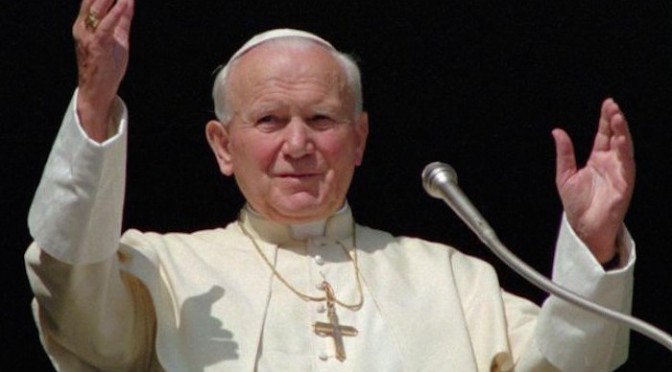Easter / Earth Day, April 23, 2000
Pope John Paul II
Vatican City
Your Holiness:
In November of 1999, this Committee sent to you a letter bearing 1,643 signatures representing the many millions of Pagans worldwide, and requesting the inclusion of our Pagan forebears (i.e. peoples of indigenous pre-Christian religious beliefs and cultures) in your March 12, 2000 Mass of Pardon: “Universal Prayer; Confession of Sins and Asking for Forgiveness.”
We now thank you for having phrased your apology in a manner broad enough to encompass the ethnic, ancestral traditions of Paganism and Witchcraft, and the many people who were persecuted and put to death for adhering to those practices, when you confessed that:
“…Christians have often denied the Gospel; yielding to a mentality of power, they have violated the rights of ethnic groups and peoples, and shown contempt for their cultures and religious traditions…”
This was a courageous and historic step, which we acknowledge with appreciation. We are also inspired by the words of Bishop Chemello of Brazil, in his April, 2000 Apology Address: “It cannot just be a spoken forgiveness, it has to be a real reconciliation and that requires concrete actions.” We agree strongly with the following words from the Roman Catholic Catechism, as an affirmation of the need for active redress:
“1459 Many sins wrong our neighbor. One must do what is possible in order to repair the harm (e.g., return stolen goods, restore the reputation of someone slandered, pay compensation for injuries). Simple justice requires as much… Raised up from sin, the sinner must still recover his full spiritual health by doing something more to make amends for the sin: he must “make satisfaction for” or “expiate” his sins… “ (Roman Catholic Catechism, copyright 1994, Libreria Editrice Vaticana, Citta del Vaticano).
We look forward to a time when indigenous sacred sites, archived texts of relevance to indigenous religions, and common religious holy days may be freely shared between the Church and other religions.
We take great hope from your words of contrition and reconciliation. Additionally, we believe that this awakening religious tolerance must also include dialogue among the various religious traditions so that mutual understanding and education can occur. Thus, we would like to invite the Church and all other religions at this time to engage in such dialogue and education.
Interfaith colloquy is an urgent necessity as the members of our faith tradition continue to suffer from the negative stereotypes and religious bigotry resulting from hundreds of years of persecution. Thus, despite the hope inspired by your brave message, we are appalled by the Church’s continuing characterization of Nazism as “a Pagan ideology.” (Memory and Reconciliation: The Church and the Faults of the Past; Section 5.4)
This is not only offensive to Pagans, but implicates the Church as well, since Christian institutions were also used by the Nazis. Hitler co-opted many types of dialogue and symbolism, including Christian ones, for his own ends. Contemporary Pagans espouse tolerance, not hatred, and we find it abhorrent that the Nazis so corrupted elements both from the pre-Christian Norse/Germanic religions and Christianity.
We are heartened by your recent further apology to Jewish people on your pilgrimage to the Holy Land. We support your commitment to making amends, and we hope there will be more understanding and collaboration among Roman Catholics, Jews, and Pagans, as well as with other peoples. Life in the modern world demands tolerance, education, and the ability to progress toward enlightenment without persecution, fear, or prejudice.
Celebration of diversity is the essence of Paganism past and present, since Pagans are pantheists who see the divine manifested in each living being in the world, and therefore also in the practitioners of other religions than our own. We share in the firm commitment shown by the Church under your guidance to the practice of tolerance among people of all faiths. We seek to help bring forth a world in which doctrines, prayers, sacred sites, and conceptualizations of the Divine of all religions will be treated with equal respect.
We have only one world. We must now move forward with the real work at hand: that of teaching our respective religious communities how to grow and thrive, peacefully and spiritually, on this beautiful planet which we all share, and for whose sake we must learn to live in harmony.
